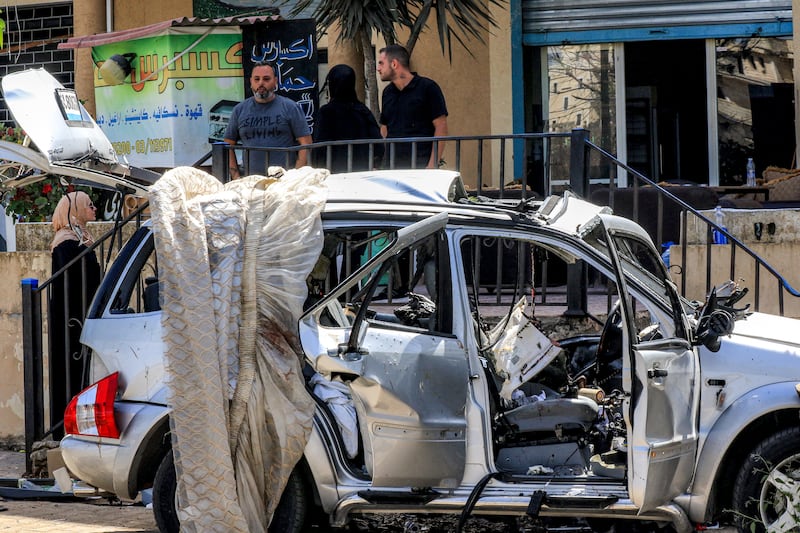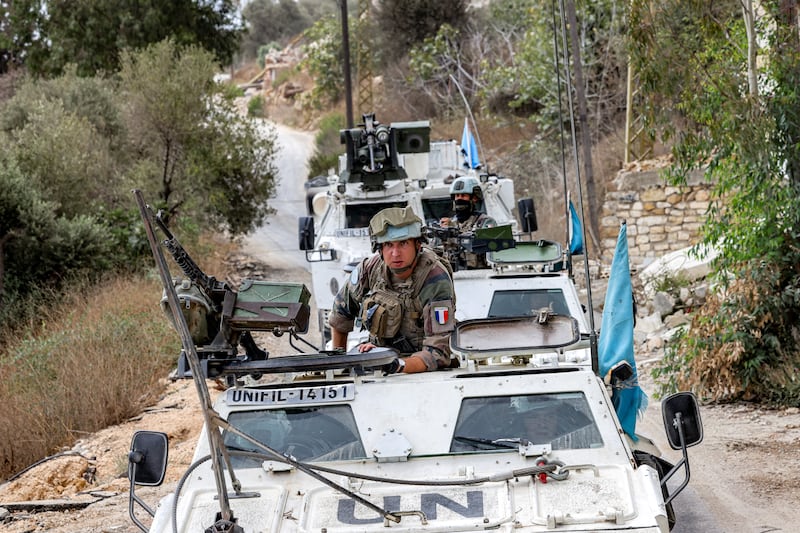Three children were among five people killed by an Israeli drone this week in southern Lebanon, with the latest attacks coming a year since the huge escalation in Israeli bombardments, and 10 months since a ceasefire came into force.
The drone attack took place on Sunday in the town of Bint Jbeil. Lebanon’s prime minister Nawaf Salam called it a “massacre”, a “deliberate crime against civilians” and a “message of intimidation targeting our people returning to their villages in the south”.
The Israeli military said it had “struck and eliminated a Hizbullah terrorist,” and expressed regret over the killing of “several uninvolved civilians”, which it said was being reviewed.
Tuesday marks the first anniversary of Israel’s escalation across Lebanon, which it said was aimed at destroying Hizbullah’s capabilities and allowing displaced Israelis to return home.
[ Israeli drones drop grenades near UN peacekeepers in LebanonOpens in new window ]
Almost 4,000 people in Lebanon were killed and more than 15,600 wounded before the ceasefire came into force on November 27th, 2024, according to Lebanon’s health ministry.
Israel has been accused of thousands of violations since the ceasefire, though its military say they are themselves acting against ceasefire violations.
Israel also failed to meet deadlines to withdraw from Lebanese territory, continuing to occupy what it calls “strategic” points.
 People inspect the wreckage of a vehicle hit in an Israeli drone strike in Bint Jbeil in southern Lebanon. Photograph: Mahmoud Zayyat/AFP/via Getty Images
People inspect the wreckage of a vehicle hit in an Israeli drone strike in Bint Jbeil in southern Lebanon. Photograph: Mahmoud Zayyat/AFP/via Getty Images
In the first five months after the ceasefire came into force, at least 71 civilians were killed by Israeli forces, the United Nations said.
By mid-September, a Unifil spokeswoman said the UN peacekeeping mission had documented almost 5,600 air violations of the ceasefire by Israel.
It documented almost 100 air attacks by Israel, figures that do not include other attacks on greater Beirut or other areas outside Unifil’s area of operations.
Unifil also said it had discovered 330 weapons caches inside Lebanon – most of which are presumed to belong to Hizbullah, while 21 “trajectories” were detected going from Lebanon to Israel.
A World Bank report released in March estimated the cost of damage from the war to housing in Lebanon at almost $4.6 billion (€3.7 billion), saying almost 163,000 housing units were affected by the war, around 10 per cent of Lebanon’s housing.
The latest conflict began on October 8th, 2023, when Hizbullah fired rockets towards Israeli-controlled territory “in solidarity” with Hamas.
A dramatic escalation occurred on September 23rd, 2024. By the following day, Lebanon’s health ministry said 558 people had been killed by Israeli forces, including at least 50 children and 94 women.
 Armoured Unifil vehicles on patrol at a position formerly held Iran-backed Hizbullah in the Khraibeh Valley in el-Meri, south Lebanon on August 27th. Photograph: Anwar Amro/AFP via Getty
Armoured Unifil vehicles on patrol at a position formerly held Iran-backed Hizbullah in the Khraibeh Valley in el-Meri, south Lebanon on August 27th. Photograph: Anwar Amro/AFP via Getty
This came a week after an Israeli attack detonated explosives inside thousands of pagers and walkie talkies distributed by Hizbullah. More than 3,450 people were wounded – largely in the eyes or hands – and at least 32 were killed, including two children.
Last week, more than 100 people marched in Beirut to remember the victims.
Hizbullah has planned various events to mark the anniversaries in the coming weeks, including a poetry festival and conference, and an “orchestral musical evening”.
In a distributed schedule, Hizbullah also said it plans to project images of its two assassinated leaders, Sayyed Hassan Nasrallah and Hashem Safieddine, on the well-known Raouche rocks, beside Beirut’s corniche, later this week. This announcement was condemned by many politicians and critics of Hizbullah, who see it as a provocation.
Nasrallah was killed on September 27th last when dozens of bunker-buster bombs were dropped on Beirut’s southern suburbs. Safieddine, his successor, was killed the following week. A funeral for both men was held in February.
Lebanon’s government is under international pressure to disarm Hizbullah, though Hizbullah has called on Israel to stop its “aggression” first. Supporters say the militant group is the only protection they have from Israel, which they see as expansionist.
Israeli prime minister Binyamin Netanyahu is connected to the idea of a “greater Israel”, which some interpret to include parts of Lebanon, Jordan, Egypt and Syria.

